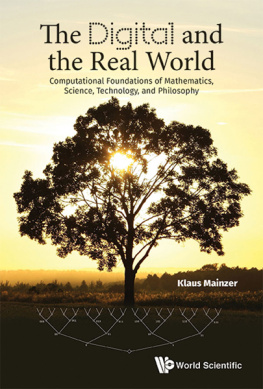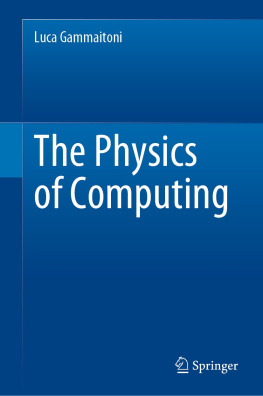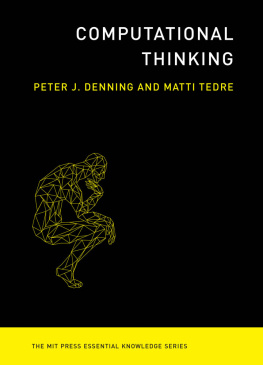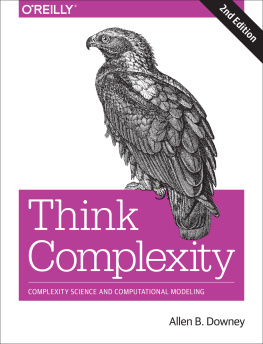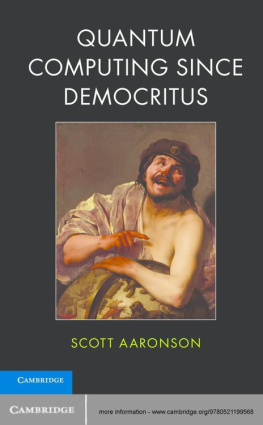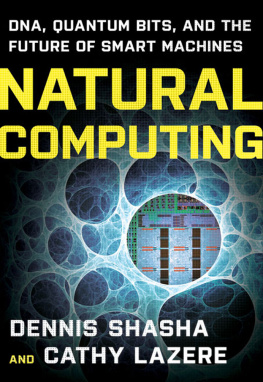THE NATURE OF COMPUTATION
The Nature of Computation
Cristopher Moore
University of New Mexico, Albuquerque
and
Santa Fe Institute
Stephan Mertens
Otto-von-Guericke University, Magdeburg
and
Santa Fe Institute


Great Clarendon Street,
Oxford OX2 6DP Oxford University Press is a department of the University of Oxford.
It furthers the Universitys objective of excellence in research, scholarship,
and education by publishing worldwide in
Oxford New York
Auckland Cape Town Dar es Salaam Hong Kong Karachi
Kuala Lumpur Madrid Melbourne Mexico City Nairobi
New Delhi Shanghai Taipei Toronto
With offices in
Argentina Austria Brazil Chile Czech Republic France Greece
Guatemala Hungary Italy Japan Poland Portugal Singapore
South Korea Switzerland Thailand Turkey Ukraine Vietnam
Oxford is a registered trade mark of Oxford University Press
in the UK and in certain other countries
Published in the United States
by Oxford University Press Inc., New York
Cristopher Moore and Stephan Mertens 2011
The moral rights of the authors have been asserted
Database right Oxford University Press (maker)
First published 2011
All rights reserved. No part of this publication may be reproduced, stored in a retrieval system, or transmitted, in any form or by any means, without the prior permission in writing of Oxford University Press, or as expressly permitted by law, or under terms agreed with the appropriate reprographics rights organization. Enquiries concerning reproduction outside the scope of the above should be sent to the Rights Department, Oxford University Press, at the address above
You must not circulate this book in any other binding or cover and you must impose the same condition on any acquirer
British Library Cataloguing in Publication Data Data available
Library of Congress Cataloging in Publication
Data Data available
Printed in Great Britain
on acid-free paper by
CPI Antony Rowe, Chippenham, Wiltshire
ISBN 978-0-19-923321-2
1 3 5 7 9 10 6 8 4 2
For Tracy and Doro
Contents
Figure Credits
, courtesy of James Dalgety
, courtesy of James Dalgety.
.
.
, courtesy of James Dalgety
Preface
The familiar essayist didnt speak to the millions; he spoke to one reader, as if the two of them were sitting side by side in front of a crackling fire with their cravats loosened, their favorite stimulants at hand, and a long evening of conversation stretching before them. His viewpoint was subjective, his frame of reference concrete, his style digressive, his eccentricities conspicuous, and his laughter usually at his own expense. And though he wrote about himself, he also wrote about a subject, something with which he was so familiar, and about which he was often so enthusiastic, that his words were suffused with a lovers intimacy.
Anne Fadiman, At Large and At Small
It is not incumbent upon you to finish the work, yet neither are you free to desist from it.
Rabbi Tarfon
The sciences that awe and inspire us deal with fundamentals. Biology tries to understand the nature of life, from its cellular machinery to the gorgeous variety of organisms. Physics seeks the laws of nature on every scale from the subatomic to the cosmic. These questions are among the things that make life worth living. Pursuing them is one of the best things humans do.
The theory of computation is no less fundamental. It tries to understand why, and how, some problems are easy while others are hard. This isnt a question of how fast our computers are, any more than astronomy is the study of telescopes. It is a question about the mathematical structures of problems, and how these structures help us solve problems or frustrate our attempts to do so. This leads us, in turn, to questions about the nature of mathematical proof, and even of intelligence and creativity.
Computer science can trace its roots back to Euclid. It emerged through the struggle to build a foundation for mathematics in the early 20th century, and flowered with the advent of electronic computers, driven partly by the cryptographic efforts of World War II. Since then, it has grown into a rich field, full of deep ideas and compelling questions. Today it stands beside other sciences as one of the lenses we use to look at the world. Anyone who truly wants to understand how the world works can no more ignore computation than they can ignore relativity or evolution.
Computer science is also one of the most flexible and dynamic sciences. New subfields like quantum computation and phase transitions have produced exciting collaborations between computer scientists, physicists, and mathematicians. When physicists ask what rules govern a quantum system, computer scientists ask what it can compute. When physicists describe the phase transition that turns water to ice, computer scientists ask whether a similar transition turns problems from easy to hard.
This book was born in 2005 when one of us was approached by a publisher to write a book explaining computational complexity to physicists. The tale grew in the telling, until we decidedwith some hubristo explain it to everyone, including computer scientists. A large part of our motivation was to write the book we would have liked to read. We fell in love with the theory of computation because of the beauty and power of its ideas, but many textbooks bury these ideas under a mountain of formalism. We have not hesitated to present material that is technically difficult when its appropriate. But at every turn we have tried to draw a clear distinction between deep ideas on the one hand and technical details on the otherjust as you would when talking to a friend.
Overall, we have endeavored to write our book with the accessibility of Martin Gardner, the playfulness of Douglas Hofstadter, and the lyricism of Vladimir Nabokov. We have almost certainly failed on all three counts. Nevertheless, we hope that the reader will share with us some of the joy and passion we feel for our adopted field. If we have reflected, however dimly, some of the radiance that drew us to this subject, we are content.
We are grateful to many people for their feedback on the draft, and for their guidance on the topics in the book: Scott Aaronson, Heiko Bauke, Paul Chapman, Andrew Childs, Aaron Clauset, Varsha Dani, Josep Daz, Owen Densmore, Irit Dinur, Ehud Friedgut, Tom Hayes, Robert Hearn, Stefan Helmreich, Reuben Hersh, Shiva Kasiviswanathan, Brian Karrer, David Kempe, Greg Kuperberg, Cormac McCarthy, Sarah Miracle, John Moore, Michel Morvan, Larry Nazareth, Mark Olah, Jim Propp, Dana Randall, Sasha Razborov, Omer Reingold, Paul Rendell, Sara Robinson, Jean-Baptiste Rouquier, Alex Russell, Jared Saia, Nicolas Schabanel, Cosma Shalizi, Thrse Smith, Darko Stefanovi, John Tromp, Vijay Vazirani, Robin Whitty, Lance Williams, Damien Woods, Jon Yard, Lenka Zdeborov, Yaojia Zhu, and Katharina Zweig.
For additional comments, we are also grateful to Lee Altenberg, Lszl Babai, Nick Baxter, Marcus Calhoun-Lopez, Timothy Chow, Nathan Collins, Will Courtney, Zheng Cui, Wim van Dam, Aaron Denney, Hang Dinh, Taylor Dupuy, Bryan Eastin, Charles Efferson, Leigh Fanning, Steve Flammia, Matthew Fricke, Benjamin Gordon, Stephen Guerin, Samuel Gutierrez, Russell Hanson, Neal Holtschulte, Peter Hoyer, Luan Jun, Valentine Kabanets, Richard Kenyon, Jeffrey Knockel, Leonid Kontorovich, Maurizio Leo, Phil Lewis, Scott Levy, Chien-Chi Lo, Jun Luan, Shuang Luan, Jon Machta, Jonathan Mandeville, Bodo Manthey, Sebastian Mingramm, Brian Nelson, ThanhVu Nguyen, Katherine Nystrom, Olumuyiwa Oluwasanmi, Boleszek Osinski, John Patchett, Robin Pemantle, Yuval Peres, Carlos Riofrio, Tyler Rush, Navin Rustagi, George Helmy Saad, Amin Saberi, Gary Sandine, Samantha Schwartz, Oleg Semenov, David Sherrington, Satomi Sugaya, Bert Tanner, Amitabh Trehan, Yamel Torres, David Wilson, Chris Wood, Ben Yackley, Yiming Yang, Sheng-Yang Wang, and Zhan Zhang. We apologize for any omissions from this list.
Next page

